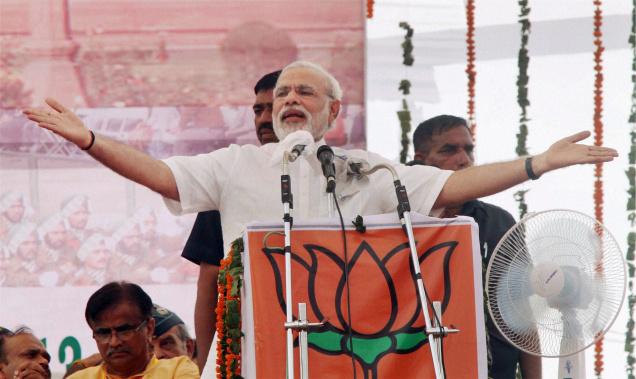
Rewari (Haryana), Sep 15: In his first public rally after being anointed BJP’s Prime Ministerial candidate, Narendra Modi today made a strong pitch for “strong leadership” at the Centre and asked politicians to take lessons in true secularism from the Army.
Modi, who has accused the UPA government of poor governance, said if the country has to be steered out of the present mess, it needs a “strong government” with a person who can lead from the front.
“If you want to see the country strong, if you want a strong government in Delhi, then check whether your name is on the voter list,” he said while urging the youth to exercise their right to vote.
In his 65-minute-long address, Modi made several references to former Prime Minister Atal Behari Vajpayee, who was considered a moderate in the BJP, and to the “true secularism” prevailing among Indian Armed Forces.
“The politics of vote banks has become disgusting in our country. Politicians who want to divide the society through vote bank politics, should learn true secularism from our armed forces,” he told the rally attended by former Army Chief Gen V K Singh and a large number of ex-servicemen.
Training his guns at the Centre, Modi said the border troubles with Pakistan and China were not because of any shortcomings in the Army.
“The problem is in Delhi. And hence the solution to this problem has to be found in Delhi itself. The problem will be solved only when a competent, patriotic and people-oriented government is formed at the Centre.,” he said.
Modi attacked Defence Minister A K Antony over his first statement in Parliament on the killing of five Indian soldiers.
“It is unfortunate that the country’s defence minister makes a statement in Parliament that someone came in Pakistani soldiers’ uniform and killed our soldiers...it must have pained our soldiers,” he said.
Modi also chose the occasion to attack JD(U), which parted ways with NDA three months ago ending a 17-year-old alliance over his elevation.
“It is the acme of shamelessness when a public representative says that people join Army to die. No leader, no political party would have humiliated (the forces) more than this....
“If you cannot recognise the sacrifice of people in armed forces, don’t insult the soldiers who are fighting for the security of the country“,” he said.
Modi was referring to remarks by a minister in Nitish Kumar government in Bihar for which the JD(U) had pulled up him. The rivalry between Kumar and Modi is well-known.
Lashing out at the policies of the Centre, he said that “every day we are facing problems...Pakistan is not giving up its design...China is showing us its might by intrusion... is keen to stop Brahmaputra rivers water and wants to take control over Arunachal Pardesh.”
”...The government that is sitting in Delhi is not at all concerned about them. They feel that such incidents keep taking place,” he said.
Noting that today’s rally is the “call for change” and that the “land of Haryana has challenged the Delhi Sultanate”, he said “when you are standing amid the Army in battlefield, then your ability to lead is seen.
He should have capacity, a war strategy and the yearning to stand in the front, he said.





Comments
Add new comment